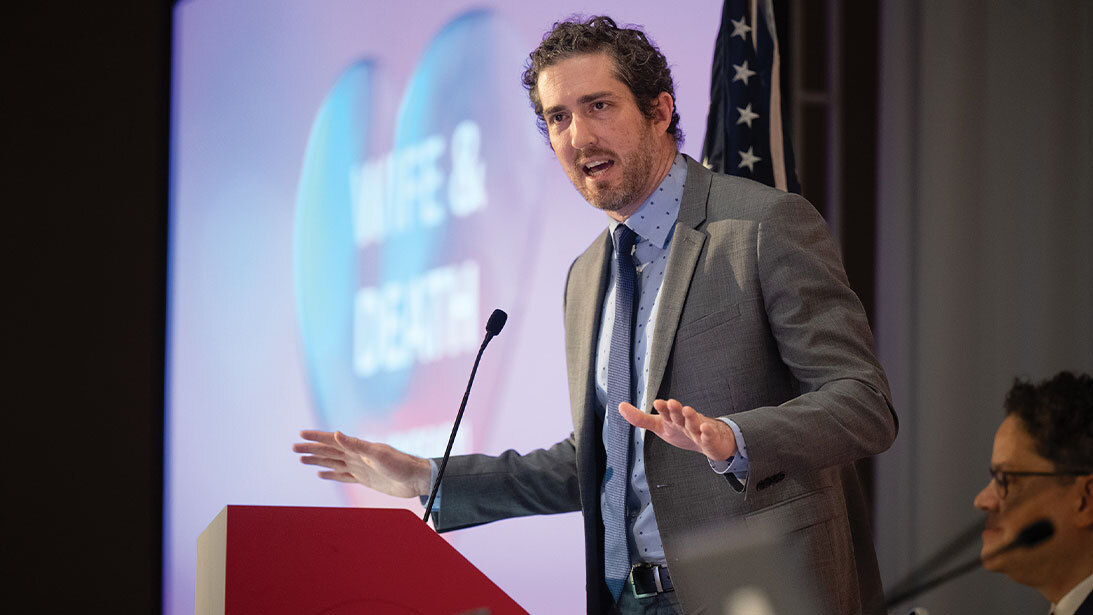
On Tuesday afternoon, hundreds of people flooded the annual donor appreciation luncheon of the Political Action Committee of the American Association of Orthopaedic Surgeons (OrthoPAC) to laugh and learn from Will Flanary, MD--better known by his 4 million followers on social media as “Dr. Glaucomflecken.” In addition to the keynote speaker, the event was special because of the OrthoPAC’s 25th anniversary celebration, the rollout of its new logo and tagline, “Unity in Orthopaedics,” highlighted by OrthoPAC Executive Committee Chair Wayne Johnson, MD, FAAOS.
Dr. Glaucomflecken shared his personal story of going from comedian to ophthalmologist to patient and accidental healthcare advocate. He began his speech, titled “Wife and Death (and Advocacy),” with some lighthearted jokes poking fun of the orthopaedic profession. “I’m onto you,” he said, after rattling off some of the titles of on-site presentations at the meeting. “Sounds complicated for someone who has to admit all of their patients to ‘medicine.’”
Dr. Glaucomflecken said he believes orthopaedic surgeons are some of the smartest people in the field. He recalled choosing to go into ophthalmology because he liked surgery, eyeballs, “and to sit down.”
During his third year of medical school, he suddenly found himself in the shoes of his patients. He was diagnosed with cancer, and although he was able to recover physically after surgery, emotionally it was a big deal. He said it felt lonely to experience the healthcare system at such a young age, so he dealt with it the only way he knew how: comedy. He was again a patient two more times over the next few years, once during his residency at the University of Iowa when the cancer was found again, and in 2020 during the heat of COVID-19 when he went into cardiac arrest. His wife, Kristin (better known as Lady Glaucomflecken), called 911 and performed 10 minutes of CPR until paramedics arrived. “Never have I ever been so happy to have structural damage to my house,” he said, before assuring the audience, “You can laugh. It’s okay, I’m alright now.”
Fortunately, he made a full recovery, but it was an experience that changed his perspective on life and his content on social media. One of his TikTok videos about the woes of prior authorization resulted in more than a million views and 30 thousand comments from people sharing their own patient experiences. “I opened the flood gates,” he said. “People wanted to vent about the U.S. healthcare system.” It was at that point when he realized the value of using social media for advocacy.
The remainder of his remarks during the luncheon centered around how physicians, as the face of healthcare, can use their knowledge of problems to lend their voice in policy discussions both in Congress and on social media. Last fall, he posted a series of videos under the theme “30 Days of U.S. Healthcare,” which used satire to break down complicated policy issues in a simplistic and straightforward way. One video about prior authorization delaying patient care caught the eye of a health insurance company that asked him to take it down. “Companies pay attention and care about social media. It’s the only thing they can’t control, and I think that really bothers them,” he said.
Dr. Glaucomflecken made the case that physician advocates do not have to have all of the answers to complex problems, and they do not have to be famous stand-up comedians either. They just have to educate patients and policymakers, because advocacy itself is power. He closed by thanking the OrthoPAC donors for listening and for “being a part of the chain of survival that saved my life and the lives of so many others every day.”
From hearing Dr. Glaucomflecken’s story, the OrthoPAC hopes that more AAOS members in the United States will understand the importance of engaging in healthcare policy advocacy and be inspired to become active advocates for advancing musculoskeletal care. Anyone interested in learning more about how to get started should visit aaos.org/advocacy. Hear more from Dr. Glaucomflecken in an upcoming interview on the AAOS Advocacy Podcast and in a future article in AAOS Now.
Kristen Coultas is the director of advocacy and new media communications at AAOS.